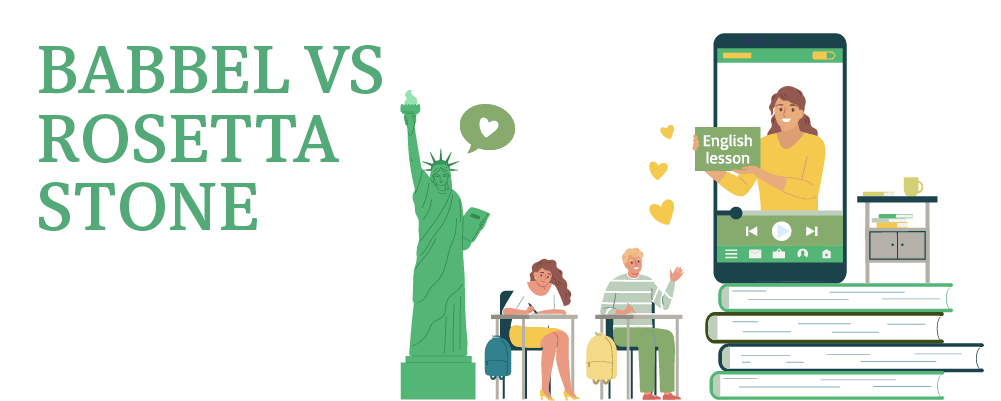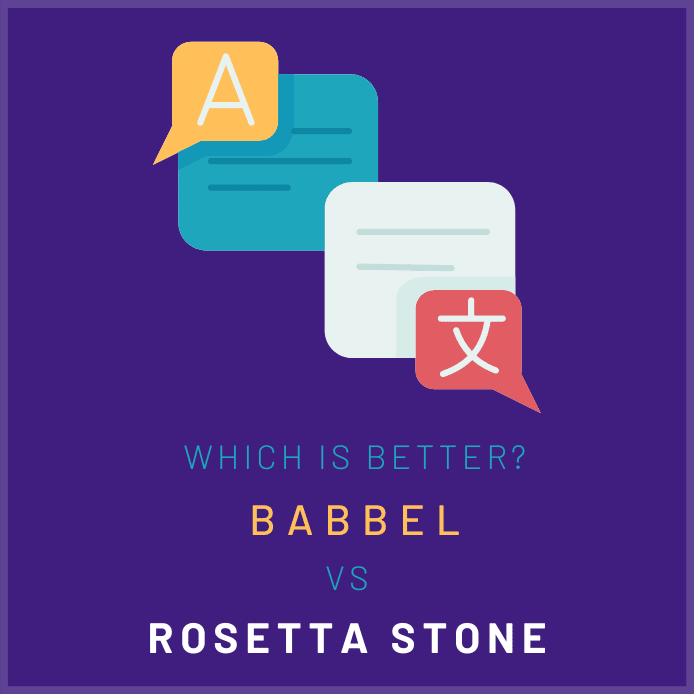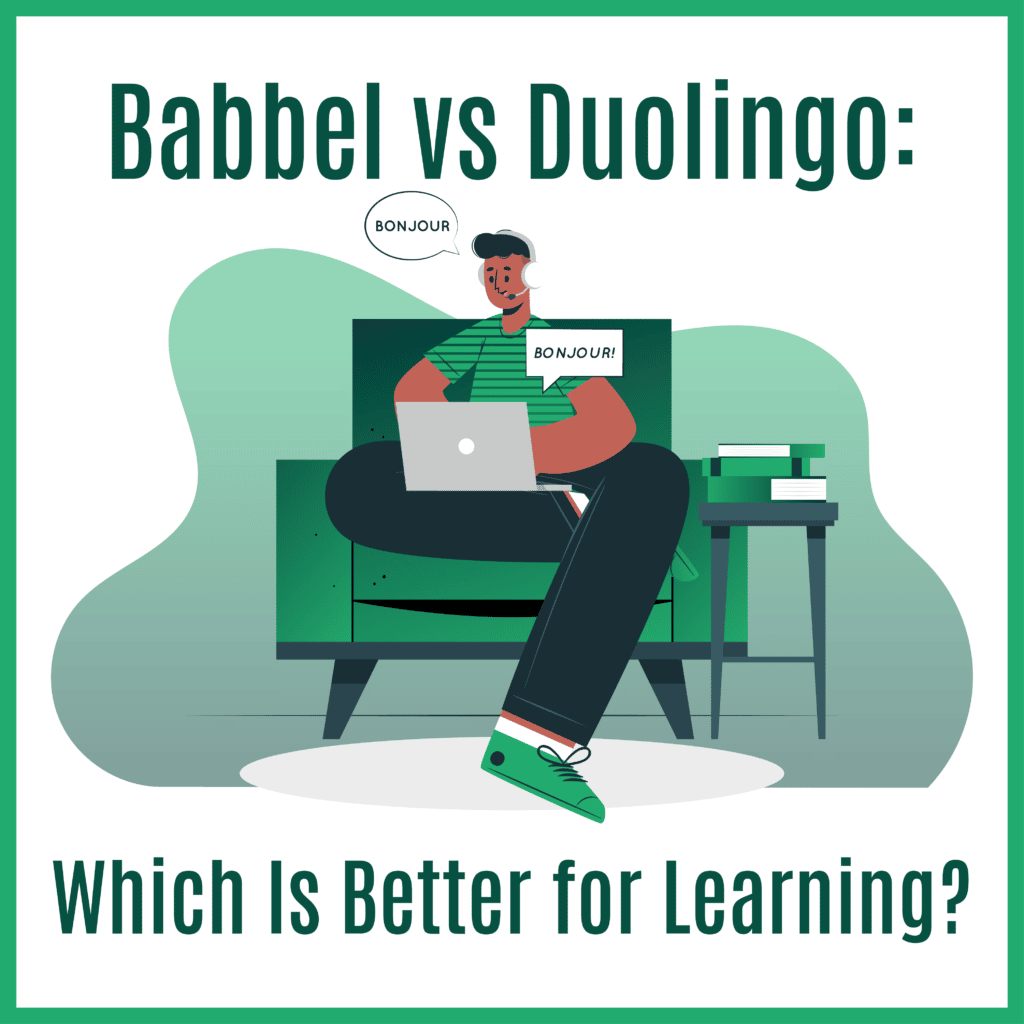Finding the best language-learning app is important for those who want to master a new language. If you commit to a program that doesn’t fit with your learning style, you could be setting yourself up for failure. That’s why in this blog post, we will compare two of the top-rated language learning apps from Babbel and Rosetta Stone.
So, how does one determine which language app will check all their boxes and have them speaking fluently in no time?
Keep reading to find out.
| Babbel | Rosetta Stone | |
| Starting Year | 1992 | 2007 |
| Created by Language Experts |  |  |
| Bite-sized Lessons |  |  |
| Grammar Lessons |  |  |
| Original Native Language Stories |  |  |
| Speech Recognition Technology |  |  |
| Personalized Instruction |  |  |
| Program Cost | $ | $$$ |
We’ll take a close look at Babbel vs Rosetta Stone, two of the top choices, and see how they compare.
Let’s start with Babbel.
Benefits & Drawbacks of Babbel
This list won’t be exhaustive by any means, but it will give you a solid rundown of the most influential pros and cons of the Babbel platform. We’ll also examine how Babbel facilitates the absolute basics of learning vocabulary and grammar rules.
Integrated Grammar Lessons
One of the biggest benefits to Babbel is the well-structured lessons that have helpful grammar tips. Learning a second language is more than just learning the spoken words; it’s learning the speaking skills to put those words together meaningfully. Babbel helps you build skills like a native speaker, unlike the Rosetta Stone Program.
Additionally, Babbel offers some great opportunities to gain a deeper understanding of the language. For example, the supplementary grammar section includes tips and grammar points for every lesson.
What does this look like?
In their Spanish courses (and others), exercises include a brief explanation about a grammar topic (i.e., adverbs). Then, a quick drill follows the mini-lesson to reinforce what was just introduced.
Ideal If English Is Your Native Language
All the language and vocabulary lessons are conducted in English, with English explanations. This means Babbel is ideal for English-speaking people to get speaking practice in other languages. Babbel’s lessons aren’t ideal if you want to build your English language skills.
Wide Variety Of Lesson Exercises
Another benefit of Babbel over Rosetta Stone lessons is that Babbel has significantly more variety in the lesson types. While most of the lessons give you practice speaking the vocabulary into the app, where voice recognition technology determines if you were able to answer correctly.
After a few writing and speaking practice exercises, the user is given review exercises to ensure maximum retention. Before moving on to new words in your language course, these review exercises must be completed.
When it comes to Rosetta Stone vs Babbel, this is a big will for the B.
Download Lessons For Offline Use
There are a lot of people that want to use a language learning app in their offline time or during travel, or while they’re commuting. For many, that means using the app offline while still being able to practice the pronunciation. You can also use the audio companion of the app.
Babbel also allows lesson downloads. By downloading the lessons ahead of time, the user can go into airplane mode or away from wifi or cellular coverage and still be able to use the Babbel app. This gives the app a massive range of use that other similar apps don’t offer.
Voice Recognition Can Be Frustrating
While the voice recognition software used by Babbel is fantastic, there are instances where the voice recognition technology simply isn’t the best and makes you repeat the same words over and over before it recognizes them. This is a Babbel vs Rosetta Stone loss for the B.
This can make some lessons feel more than a bit repetitive. There isn’t a ton of variety in the lessons, to begin with, but when you need to take several minutes to say a single word of new vocabulary so that it’s recognized, it can wear down your patience–fast.
Conversational Language Requires Additional Resources
One of the significant drawbacks to Babbel is the lack of conversation practice. Unlike Rosetta stone, Babbel isn’t as big on real-world convos. Babbel is great for getting a solid start on one language at a time but doesn’t offer the free resources to gain conversational fluency in any of them without additional resources.
While these resources aren’t incredibly expensive, like the language tutoring platform italki, they still cost more money than you’ve already spent on the app. So if you go with Babbel, expect to pay more for the language-learning resources that you want.
To gain conversational skills, you may need to pay a tutor or step outside of the app.
Benefits & Drawbacks of Rosetta Stone
Let’s look at the Rosetta Stone vs. Babbel comparison from a different perspective.
Rosetta Stone is a unique language learning platform that lets users pay by the language, by the year, or in a lifetime access framework.
With Rosetta Stone, you’ll get the following.
Better Voice Recognition Software
In the exercises where you need to repeat the word back to the app, Rosetta Stone’s voice recognition software seems to be much smoother and more adept at understanding non-native speaker answers. This high-tech perk can really appeal to some learners.
They also do a better job at helping you in the conversation department. Their Youtube account is full of conversational videos to help you navigate various every day encounters.
Good For Visual Learners
One thing that is discussed a lot when looking at Babbel vs Rosetta Stone is learning styles.
Most of Rosetta Stone’s lessons consist of matching words to pictures and a few extra features. There are visual clues to help the learner determine the correct answers, but Rosetta Stone offers a largely immersive experience.
So, if you’d rather learn visually rather than speaking your own sentences, Rosetta Stone is a good fit.
Live Coaching
Getting live feedback and coaching on your pronunciation can dramatically help to adopt a new language. This is especially true with Asian languages, where pronunciation can be fundamental to meaning. This is one area where Rosetta Stone is clearly at an advantage over Babbel, particularly for those studying complex languages like Mandarin or Arabic.
Repetitive Exercises
Babble may not have much variety in its lesson styles, but Rosetta Stone has even less variety. So, the win goes to Babbel by default in this Rosetta Stone vs Babbel face-off.
In some respects, this can help users focus on consistency in the lessons, but for others, it can get monotonous and boring very quickly. If you need a lot of variety, Rosetta Stone probably isn’t for you.
It Can Be Monotonous
Since there is a startling lack of variety in the lesson styles, there is a considerable tendency for the user to get bored and begin to lose interest. This can signal the beginning of the end for those with short attention spans or little motivation. If the app doesn’t draw you in with engaging content, it becomes less likely to use it long-term.
Super disciplined and committed to learning a new language?
Rosetta Stone might work for you.
But if you’re even the least bit flighty, both Babbel and Rosetta Stone might be less-than-stellar options.
Their Pictographic Approach Can Be Confusing
Since the focus is mainly on audiovisual learning with Rosetta Stone, and it uses the target language only, in many cases, there is a need for more detail or information than the accompanying pictures can relay.
You’re graded on each lesson according to your pronunciation, grammar, writing, listening, and vocabulary. Rosetta stone is great for visual learners, but for those that need additional help, it can be a challenging platform to use.
Availability Of Target Language
Babel offers a total of 14 languages. The language learning courses span Danish, Indonesian, Russian, Norwegian, English, German, French, Italian, Portuguese, Swedish, and Turkish.
The number of Rosetta Stone language courses is nearly twice that of Babbel, with 25 different languages. The language learning resources offered by Rosetta Stone include:
- Arabic
- Mandarin Chinese
- Danish
- British English
- Greek
- Hebrew
- Hindi
- Irish
- Japanese
- Korean
- Latin
- Persian – Farsi
- Polish
- Portuguese
- Russian
- Spanish
- Swedish
- Turkish
- Vietnamese
FAQs
Rosetta Stone is a great language program for those looking for language learning apps that can help them with a more immersive experience. On the other hand, Babbel is better for grammar explanations and a more thorough language-learning process.
How the lesson content is presented is a critical difference between Babbel and Rosetta Stone. Babbel’s lessons make the language learning journey taken mainly in one language, English. Rosetta Stone’s lessons are conducted almost exclusively in the target language, making language learning more immersive with voice recognition software.
It is possible to become fluent in a language with Babell. However, you will need extra resources. With Babbel, since there are highly limited conversational language learning resources, it isn’t possible to use Babbel lessons alone to become fluent in any target language.
Why is Babbel Better than Rosetta Stone?
Babbel is much better than Rosetta Stone lessons for helping language learners get a more complex grammar understanding. They also offer a better foundation of basic vocabulary words. Babbel lets you practice offline as well. This gives a point for Babbel in the Babbel vs Rosetta Stone debate.
You might also be interested in seeing the winner in the debate of Babbel vs Duolingo.
Knowing The Differences In Babbel vs Rosetta Stone Is Crucial For Learning A New Language
For anyone looking to pick up a new language, understanding the differences in the learning platforms available is vital to find one that fits your learning style. In particular, people who aren’t visual learners should consider which platform they choose for their foreign language learning.




